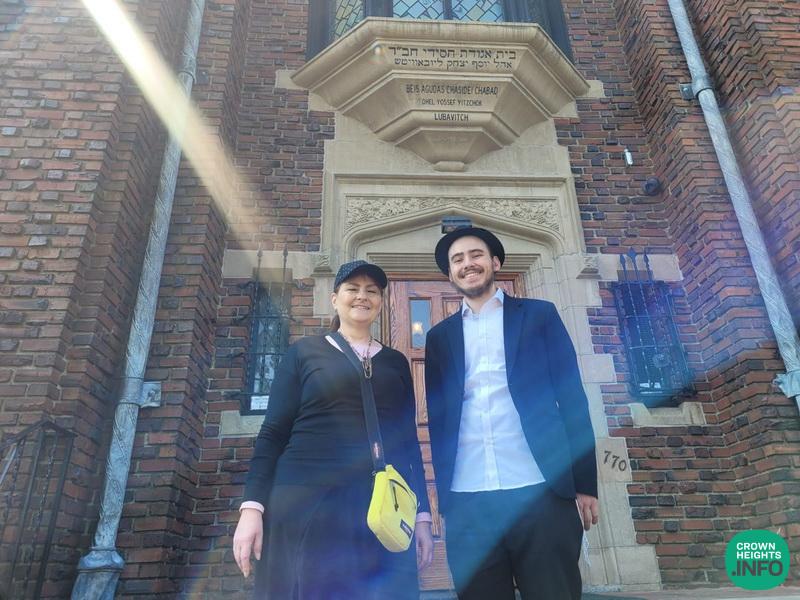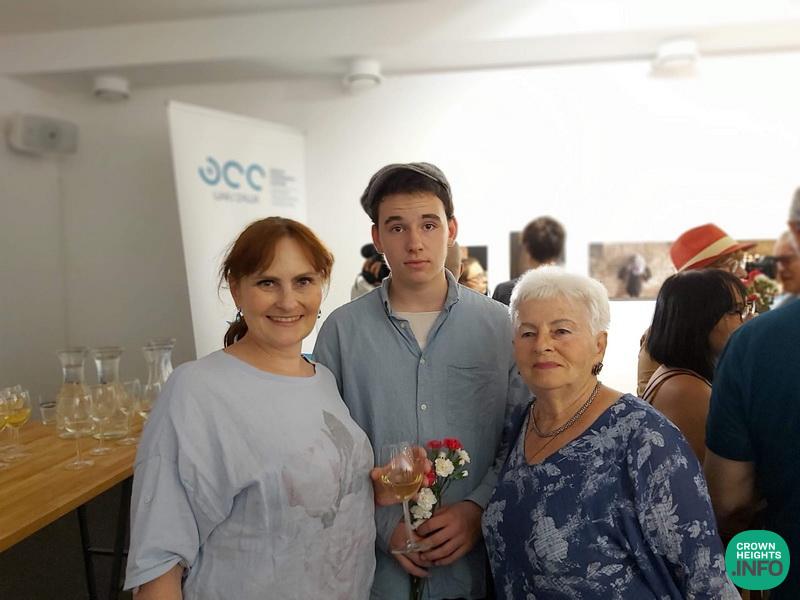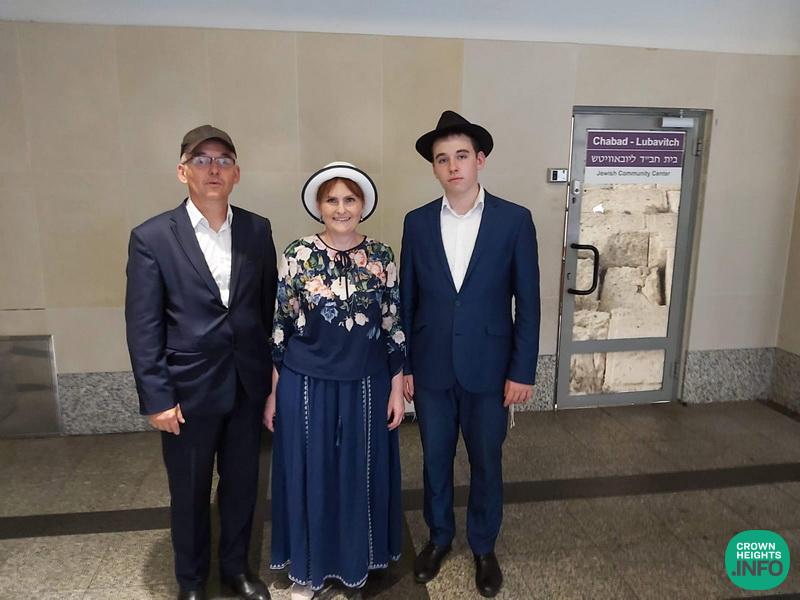
17 Years Later, Mazal Barbas Looks Back on Chabad of Poland’s Impact on Her Family
Mazal Barbaś was born into a Jewish family but growing up during the post-Holocaust communist era her family was scared to tell her about it. Born in 1968 in Warsaw, Poland in the vestiges of what was once a thriving Jewry decimated by the Holocaust, the decision to keep Mazal’s – or back then, Magdalena’s – Jewish identity a secret was not an uncommon choice among the few Polish-Jews who remained after the war.
“My grandparents didn’t want me to know that I am Jewish. They hardly survived the war themselves and they didn’t want us to live as they did, identified as Jews, and potentially as targets for antisemitism. They wanted to give us a ‘normal, relatively safe and calm, Polish lives,” Mazal recounted, explaining how she wasn’t even made aware of her Jewish lineage until she turned 16.
Before the war, Poland was the thriving center of Europe’s largest Jewish population with ancestry dating back nearly 1,000 years, before the Nazis murdered 3,000,000 Polish Jews during the Second World War. When the war ended, the country became part of the communist bloc, and the few Jews who survived went into hiding, scared to practice their traditions and fearing a growth in antisemitic incidents.
For most like Mazal, the Holocaust’s generational reverberations, compounded by the popularity of the Communist movements’ anti-Semitic sentiments, including one that was close to Mazal’s home when her mother, who lived through the horrors of the Holocaust as a child in the Warsaw Ghetto, was harassed while working in the finance department of a national media conglomerate, cast Poland’s remaining Jews into the shadows. Whether driven by societal antisemitism or the fear generated by the Holocaust, the collective self-suppression of Jewish identity in Warsaw was very real.
In many ways, Mazal’s generation was lost to Jewish faith and tradition, born amid a generation of those hiding their faith, she grew up not learning about her Jewish heritage, customs, prayer and tradition. As a child, there were no Shabbat candles lit every Friday night, no Kiddush and Challah on Shabbat, no concept of going to synagogue or Jewish communal gatherings of any kind, and certainly not apples dipped in honey, or the blowing of the shofar to celebrate Rosh Hashanah.
Mazal married Andrzej, and in 2003 and welcomed their son, Icchok into the world. She soon realized she didn’t want her son to grow up in a world devoid of Jewish community and faith, and in 2006, she first crossed the threshold of Chabad of Poland’s burgeoning Jewish community center and fell into the warm embrace of the newly minted Lubavitch emissaries Rabbi Shalom Ber and Rebbetzin Dina Stambler.
“I wanted my son to be part of a Jewish community – an actual Jewish community – because in Poland that didn’t exist, especially not for someone like me who was starting from scratch,” Mazal recounted of her first introduction to Chabad 17 years ago. “There are a lot of people here who might be Jewish, but know very little about Jewish practices and culture, and for those with that background, they struggle to welcome people like me who came from a Polish background devoid of everything Jewish.”
Welcomed with open arms by the Stamblers, Mazal soon found herself and her son immersed in the synagogue’s camaraderie and collective religious unity and shared identity likewise cherished by many Jewish congregants worldwide. The warm light of kindling the Shabbat candles, the beauty of the prayers and sharing of Shabbat and Yom Tov meals with fellow Polish Jews at the Chabad dinner table from that point became a fixture for Mazal and her son. Despite the 60-minute commute from their home to Chabad, Mazal and Icchok would make the trek regularly to ensure they could celebrate Shabbat and Yomim Tovim with their community, and both would make the trip on Sundays and weeknights to other communal gatherings and learning opportunities.
When it came time to celebrate Icchok’s Bar Mitzvah, it’s no surprise that it was a major production for both the family and the Chabad of Poland. Rabbi Stambler helped Icchok prepare for the momentous occasion and put on Tefillin for the first time. Icchok was called to the Torah, and the group celebrated with a warm Shabbat meal.
Two years later, inspired by his growing learning and connection to the Chabad of Poland, Icchok, now 15-year-old Icchok Chaim, committed to becoming Shomer Shabbat, prompting his mother to follow shortly after.

“Growing up, I felt that outside of attending services at Chabad there was no meaning,” Icchok said. “All the places where we experienced true joy were at Chabad. The place where people would be honest, happy, and open with each other was Chabad.”
Now, at twenty, having attended his later years of high school in Israel and currently learning at Yeshivas Tomchei Temimim in Migdal Ha’Emek, Israel, Icchok Chaim “Itche” has fully embraced his Jewish observance. And whenever back in Poland, he’s sure to visit with the Stamblers and participate in davening, meals and communal events at Chabad of Poland.
His mother, Mazal, she’s looking forward to celebrating her 17th Rosh Hashana with the Chabad of Poland. “Before we came to Chabad of Poland, we knew we were Jewish but it was not a spiritual or religious experience. That all changed with Chabad of Poland,” Mazal said.
In the time leading up to Rosh Hashana, Mazal and her mother are volunteering their time helping Chabad of Poland to prepare to support Ukrainian refugees this high holiday season. They are working with Rabbi Sholom Ber and Rebetzin Dina Stambler in Warsaw, and Chabad of Poland’s co-director Rabbi Mayer Stambler who’s working to marshal support from abroad, to help thousands of Ukrainian Jews celebrate the holidays.
Since the start of the Russian incursion into Ukraine, Chabad of Poland has opened its doors to Ukraine’s Jewish community offering refuge, transportation, kosher food, medical aid, financial and material assistance, childcare, educational and social services, communal activities, and administrative and legal aid to tens of thousands displaced by the conflict. Since the start of the war, Chabad in Poland has seen its expenses rise by more than US$2 million. For more information or to contribute to relief efforts, please visit: www.saveajew.org.












